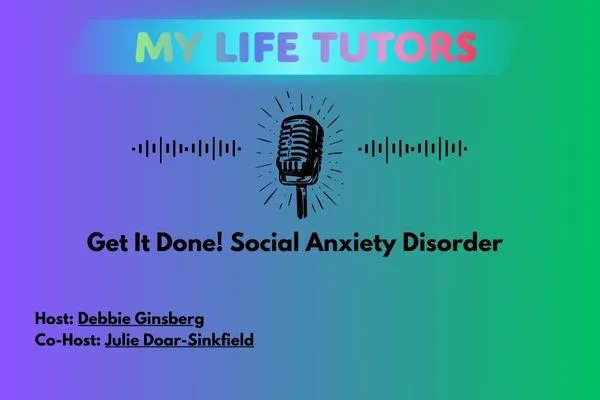My Life Tutors Blog
Learn more about our Life Tutoring services
and the motivations behind our work
My Life Tutors Blog
Learn more about our Life Tutoring services and the motivations behind our work

Episode 21: Social Anxiety Disorder on Get It Done!
Tackling Social Anxiety and Panic Attacks for the Neurodivergent Individual
Introduction:
Welcome to the Get It Done for the Neurodivergent Individual blog, hosted by Debbie Ginsberg from OrganizeU4Life and Julie Doar-Sinkfield from MyLifeTutors. In this post, we explore the challenges of social anxiety and panic attacks, especially as they pertain to neurodivergent individuals. From practical advice to real-life examples, we delve into strategies for managing these issues effectively.
Understanding Social Anxiety and Panic Attacks
Debbie and Julie discuss the pervasive nature of social anxiety, which affects many clients with neurodivergent diagnoses. Social anxiety can make it difficult to approach others, start conversations, and build friendships. For instance, one client was hesitant to invite acquaintances from a bar to a movie, fearing rejection and misunderstanding. Julie emphasizes that while college life is often portrayed as naturally social, the reality is that many students struggle with initiating interactions.
Strategies for Overcoming Social Anxiety
Rehearsal and Preparation: Julie and Debbie both stress the importance of rehearsing social interactions. Whether it's preparing for a job interview or a casual conversation, rehearsing can help reduce anxiety and build confidence. For example, Debbie recounts how she guided a client through the process of speaking to a manager about a job, resulting in a successful interaction.
Joining Clubs and Events: Julie suggests attending events hosted by clubs as a low-pressure way to meet people before fully committing to joining the club. This allows individuals to become comfortable in a social setting gradually.
Alternative Activities: For those dating or meeting new people, Debbie recommends activities that minimize pressure, such as going to a batting cage, playing miniature golf, or watching a movie. These activities provide a distraction and facilitate more natural interactions.
Expressing Vulnerability: Julie encourages clients to share small vulnerabilities, which can help build connections with others. Expressing genuine feelings can empower both the speaker and the listener, fostering empathy and understanding.
Managing Panic Attacks
Julie explains that panic attacks are intense episodes of fear or discomfort, often accompanied by physical symptoms like a racing heart or shortness of breath. Many clients don't recognize these symptoms as panic attacks, which can prevent them from seeking help. Debbie and Julie work with clients to identify signs of panic attacks and employ techniques to manage them, such as deep breathing, mindfulness, and grounding exercises.
Key Takeaways:
Preparation is Key: Rehearsing social interactions can reduce anxiety and increase confidence.
Start Small: Gradual exposure to social settings, such as attending club events, can help build comfort.
Choose Low-Pressure Activities: Engaging in activities that don't require constant conversation can ease social interactions.
Express Vulnerability: Sharing personal experiences can foster connections and reduce feelings of isolation.
Recognize and Manage Panic Attacks: Understanding the signs and symptoms of panic attacks and employing coping techniques is crucial.
Conclusion:
Social anxiety and panic attacks are common challenges for neurodivergent individuals, but with the right strategies and support, they can be managed effectively. By preparing for social interactions, gradually increasing exposure to social settings, choosing low-pressure activities, expressing vulnerability, and recognizing panic attack symptoms, individuals can build confidence and form meaningful connections. Debbie and Julie's insights provide a valuable roadmap for navigating these issues, ultimately helping clients lead more fulfilling and connected lives.
. . . Take the First Step . . .
Ready to Transform Your Life?
Reach Out and Let's Chat!

Hours of Operation:
M-F 10 am - 5pm EST/1PM - 8PM PST
Rockfield Road
Windsor Mill, MD 21244
Serving the Continental United States